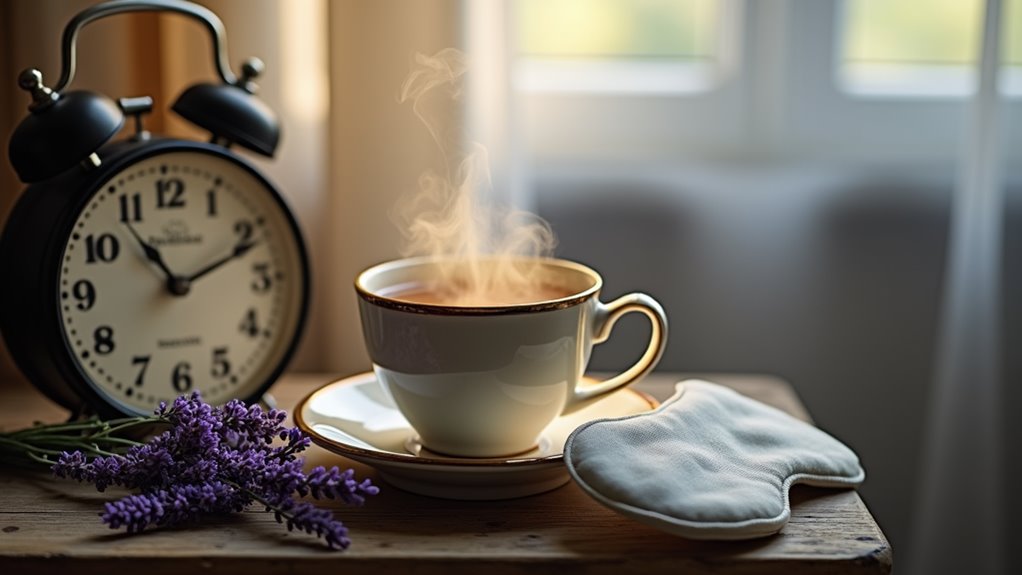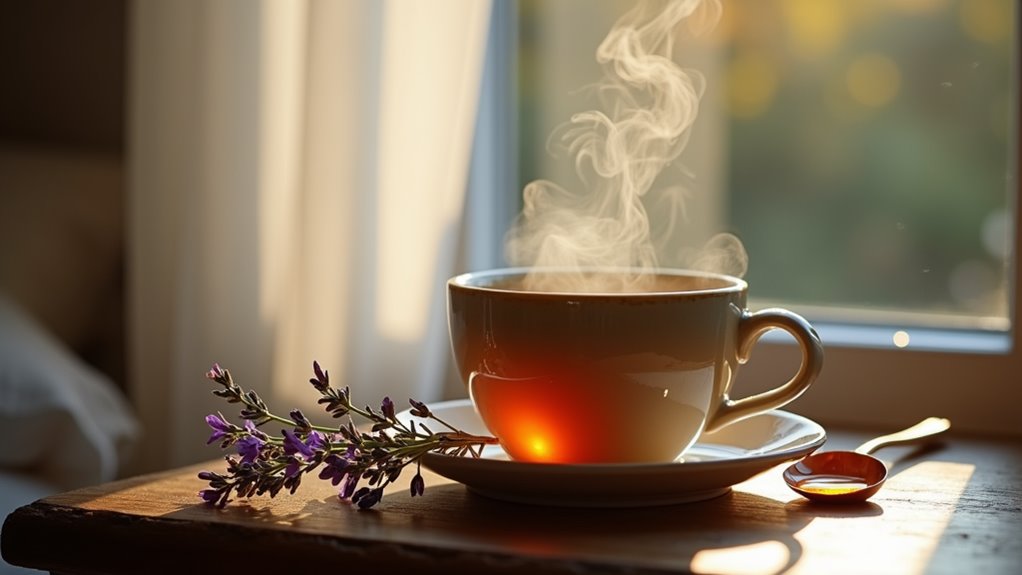Sleep Like a Baby With These Natural Sleep Enhancers!
To sleep like a baby, you can incorporate natural sleep enhancers into your routine. Try herbal remedies like valerian root or chamomile to help you relax. Don’t forget to maintain a consistent sleep schedule and create a calming nighttime atmosphere. Techniques like deep breathing or gentle stretching will also calm your mind and body. Eating magnesium-rich foods or light snacks before bed can promote better sleep. Lastly, ensure your sleep environment is dark, cool, and quiet for optimal rest. There’s much more to explore about creating the perfect conditions for sleep that you’ll want to discover!
Herbal Remedies for Sleep
Have you ever considered how herbal remedies can improve your sleep? Many people turn to nature’s solutions for a restful night.
Herbs like valerian root, chamomile, and passionflower can gently lull you into slumber. Valerian root acts as a natural sedative, helping you fall asleep faster. Chamomile tea, known for its calming properties, can soothe your mind and prepare your body for rest.
Passionflower is another great option, reducing anxiety and enhancing sleep quality. You might also find lavender essential oil beneficial; its aroma promotes relaxation.
Incorporating these herbal remedies into your bedtime routine could make a significant difference. So, why not explore these natural sleep enhancers and reclaim those peaceful nights? Your body and mind will thank you.
Importance of Sleep Hygiene
While herbal remedies can play a role in improving sleep, maintaining good sleep hygiene is equally crucial for achieving restful nights.
You can start by establishing a consistent sleep schedule; go to bed and wake up at the same time daily. Create a calming bedtime routine that signals your body it’s time to wind down.
Your sleep environment matters too—keep your bedroom cool, dark, and quiet. Avoid screens at least an hour before bed, as blue light can interfere with your natural sleep cycle.
Additionally, limit caffeine and heavy meals in the evening. By prioritizing these practices, you’ll set the stage for better sleep quality and feel more refreshed each morning.
Good sleep hygiene is foundational for a healthier life.
Relaxation Techniques
To promote restful sleep, incorporating relaxation techniques into your nightly routine can be incredibly beneficial.
Start by setting aside at least 15 minutes before bedtime to unwind. Try deep breathing exercises; inhale slowly through your nose, hold for a few seconds, then exhale through your mouth.
You can also practice progressive muscle relaxation, where you tense and then relax each muscle group, starting from your toes and moving up to your head.
Guided imagery is another effective method—visualize a peaceful scene, like a beach or forest.
Lastly, consider gentle stretching or yoga to release tension.
Dietary Choices for Better Sleep
Making smart dietary choices can significantly impact your sleep quality. Incorporating foods rich in magnesium, like spinach and almonds, can help relax your muscles and promote deeper sleep.
You might also want to try consuming complex carbohydrates, such as whole grains, which can boost serotonin levels, aiding in relaxation.
Limiting caffeine and heavy meals before bedtime is crucial, too; both can disrupt your sleep cycle. Instead, consider a light snack that includes a combination of protein and carbs, like yogurt with fruit.
Don’t forget to stay hydrated, but avoid excessive fluid intake right before bed to prevent nighttime trips to the bathroom.
Essential Oils for Restfulness
When you’re searching for natural ways to enhance your sleep, essential oils can be a powerful ally.
Lavender oil is a popular choice; its calming scent can help reduce anxiety and promote relaxation. Just a few drops on your pillow or in a diffuser can make a significant difference.
Another great option is chamomile oil, known for its soothing properties that may help you drift off faster.
You might also consider bergamot oil, which not only uplifts your mood but can also lower stress levels.
Try experimenting with different oils to see what works best for you.
Sleep-Friendly Environment
Creating a sleep-friendly environment is crucial for achieving restful nights, as even small changes can significantly impact your sleep quality.
Start by assessing your bedroom and making it a sanctuary for sleep. Here are some tips to help you create that ideal space:
-
Keep it dark: Use blackout curtains or an eye mask to block out light.
-
Control the temperature: Aim for a cool room, ideally between 60-67°F (15-19°C).
-
Minimize noise: Consider earplugs or a white noise machine to drown out disturbances.
-
Choose comfy bedding****: Invest in a quality mattress and soft sheets for ultimate comfort.
-
Declutter: Keep your bedroom tidy to promote a sense of calm and relaxation.
Make these changes, and you’ll soon notice a difference in your sleep!
Lifestyle Changes for Quality Sleep
To improve your sleep quality, adopting certain lifestyle changes can be just as important as your sleep environment. Start by establishing a consistent sleep schedule; going to bed and waking up at the same time every day helps regulate your body’s internal clock. Next, limit screen time before bed—blue light can disrupt melatonin production. Incorporate regular physical activity into your routine, but avoid vigorous workouts close to bedtime. Finally, pay attention to your diet; avoid heavy meals and caffeine in the evening.
| Lifestyle Change | Benefits |
|---|---|
| Consistent Sleep Schedule | Regulates internal clock |
| Limit Screen Time | Enhances melatonin levels |
| Regular Physical Activity | Improves sleep quality |
Frequently Asked Questions
Can I Combine Multiple Natural Sleep Enhancers Safely?
Yes, you can combine multiple natural sleep enhancers, but it’s crucial to research their interactions beforehand. Always consult a healthcare professional to ensure safety and effectiveness, as some combinations might cause unwanted side effects.
How Long Before Bedtime Should I Take Herbal Remedies?
You should take herbal remedies about 30 to 60 minutes before bedtime. This timing allows your body to absorb the ingredients effectively, promoting relaxation and making it easier for you to fall asleep peacefully.
Are There Any Side Effects From Using Essential Oils?
Yes, using essential oils can have side effects. You might experience skin irritation, allergic reactions, or respiratory issues. Always dilute oils and do a patch test before using them to minimize any potential adverse effects.
What Are the Best Sleep-Enhancing Supplements Available?
When looking for the best sleep-enhancing supplements, consider melatonin, magnesium, and valerian root. Each offers unique benefits for relaxation and sleep quality, helping you feel refreshed and ready to tackle the day ahead.
How Does Stress Impact Sleep Quality Long-Term?
Stress can significantly disrupt your sleep quality over time. It leads to racing thoughts and anxiety, making it harder to relax. If you don’t manage stress, you might experience insomnia and poor sleep patterns consistently.






